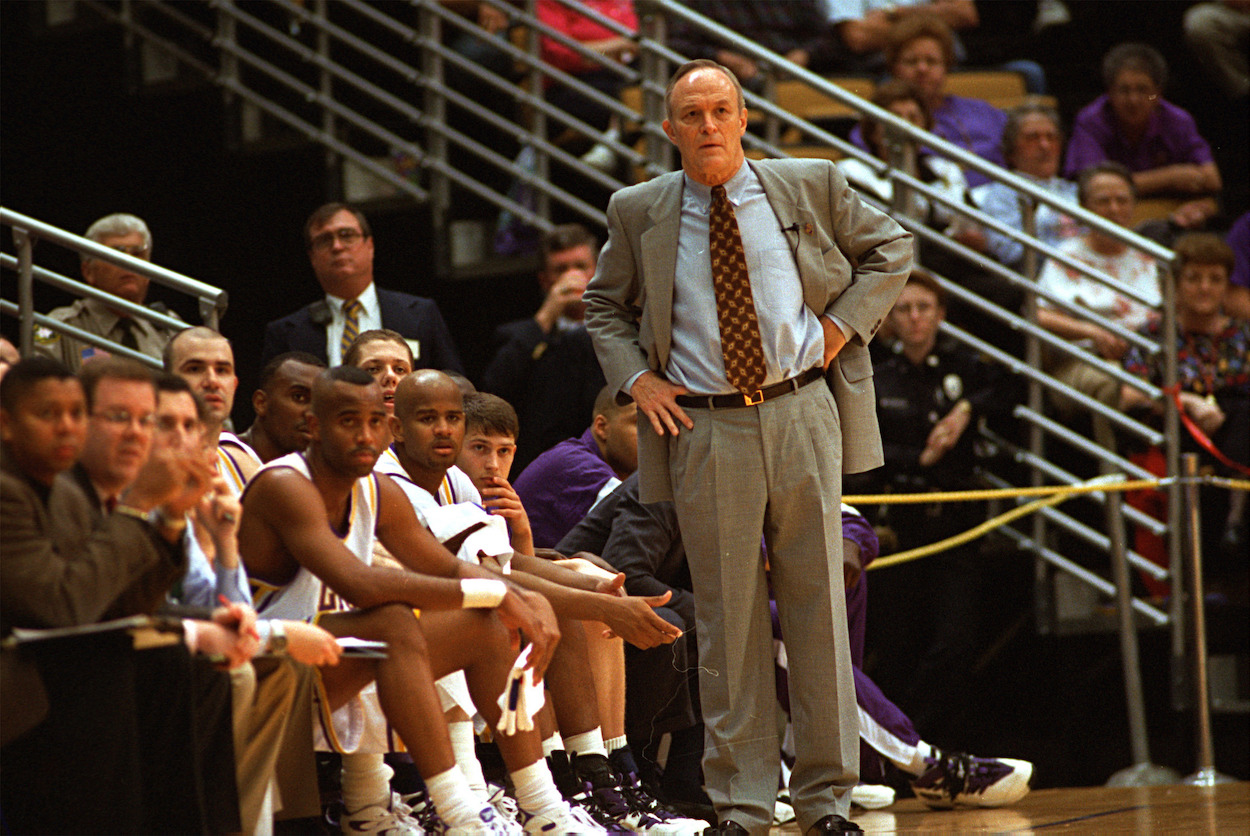NCAA
Legendary LSU Coach Dale Brown Once Referred to NCAA as ‘Gestapo Bastards’ and Still Has Choice Words for the Organization Today

Dale Brown is LSU basketball. In his distinguished 25 years at the school, he led the Tigers to four SEC titles and 13 NCAA Tournament appearances, including a pair of trips to the Final Four. He discovered Shaquille O’Neal, groomed him, and then introduced him to the world.
While he is considered one of the greatest college basketball coaches of all-time and was rewarded for his efforts by a 2014 induction into the College Basketball Hall of Fame, Brown was also one of the most outspoken critics of the NCAA. Today, 25 years after coaching his last game in Baton Rouge, the now 85-year-old Brown’s criticism of the organization that governs college athletics has not changed one bit.
Dale Brown overcomes tough childhood and turns LSU into basketball power
RELATED: LSU’s Coach Will Wade Could Be Fired This Season
Dale Brown came from humble beginnings. His father abandoned him and his mom just days before he was born. His mom raised him with very limited money, including a time where they lived off of welfare and a measly $42.50 a month. Brown, who is now 85, said his mom taught him two key lessons in life — to be honest, and speak your mind.
After coaching stops as an assistant at Utah State and Washington State, Brown landed the head coaching job at LSU in 1972 and hit the ground running. He was determined to turn the football school into a basketball power. And that’s exactly what he did.
For the next 25 years, Dale Brown guided the LSU Tigers to 13 NCAA Tournament appearances, including a pair of Final Fours in 1980-81 and 1985-86. The 1980-81 season was his best as the Tigers posted a nation’s best 31-5 mark, which included an impressive 17-1 SEC record, and a school-record 26 consecutive wins.
Unfortunately, the Tigers came up short that season and lost to Bob Knight and Indiana in the national semifinal.
Dale Brown has early run-in with the NCAA
RELATED: Remembering Shaquille O’Neal’s Epic Battle With Hank Gathers 30 Years Ago
Dale Brown also remembers 1981 for a very painful reason. That year he received a call from the mother of Mark Alcorn, a member of the 1979-80 Tigers team who had to leave after being diagnosed with cancer. A year later, Alcorn’s mom called Brown to tell him her son was dying and the family was running out of funds. She asked Brown if he would come to speak at a fundraiser. He agreed.
Mark had also requested that his three best friends on the team attend. Brown called the NCAA and explained the situation. The person at the NCAA told him it would be a violation of rules and referenced a specific page in a rulebook of more than 500 pages. Flabbergasted, Brown tried explaining it again.
“He said that’s called entertainment off campus. You can’t take your players,” Brown recalled. “What? You’re not listening to me. This young boy is dying, and I want to get them up there.”
After the NCAA official denied him yet again, Brown offered a final response. “Well, they’ll be there and I hung up on the guy.”
Dale Brown paid for all three players to attend the fundraiser and went out of his way to introduce the players to the crowd in attendance and announced that he had broken an NCAA rule. The NCAA never did anything about it.
Years after retiring still views NCAA with disdain
RELATED: March Madness History: LSU’s Shaquille O’Neal Sets All-Time NCAA Record
Dale Brown understandably lost any respect he had for the NCAA during the Mark Alcorn situation. There were other times he went toe-to-toe with the organization. He said his confrontational style once earned him an invitation to visit with the school chancellor. Brown said it was a straightforward meeting and he was asked to cut down on his rhetoric with the media.
“He said, you’re so strong and I’m worried. I’m just worried they’ll come in here and start investigating our football program, too. So all I said to the chancellor, was, thank you for being candid. Never said anything else.”
A few days later, Dale Brown said he received a call from Sports Illustrated, who sent a reporter down to spend a couple of days with him working on a cover story. At the conclusion of his visit, the reporter asked Brown in a few words how he would describe the NCAA.
“And I said, they’re Gestapo bastards. The chancellor never bothered to call me again after that.”
Now, more than two decades after coaching, Brown’s disdain for the NCAA has not wavered.
“The only thing they did well is they legislated against human dignity and they practice monumental hypocrisy,” Brown said. “Frank Deford, one of the great writers of all time, he said the NCAA is the largest legal cartel in the world. That’s true. And that’s what it is.”
On the court, Dale Brown lifted the LSU basketball program from out of the football program’s shadows and turned it into a national power. Off the court, he never shied away from taking on the NCAA and speaking his mind. His mom would be proud.
Like Sportscasting on Facebook. Follow us on Twitter @sportscasting19.











